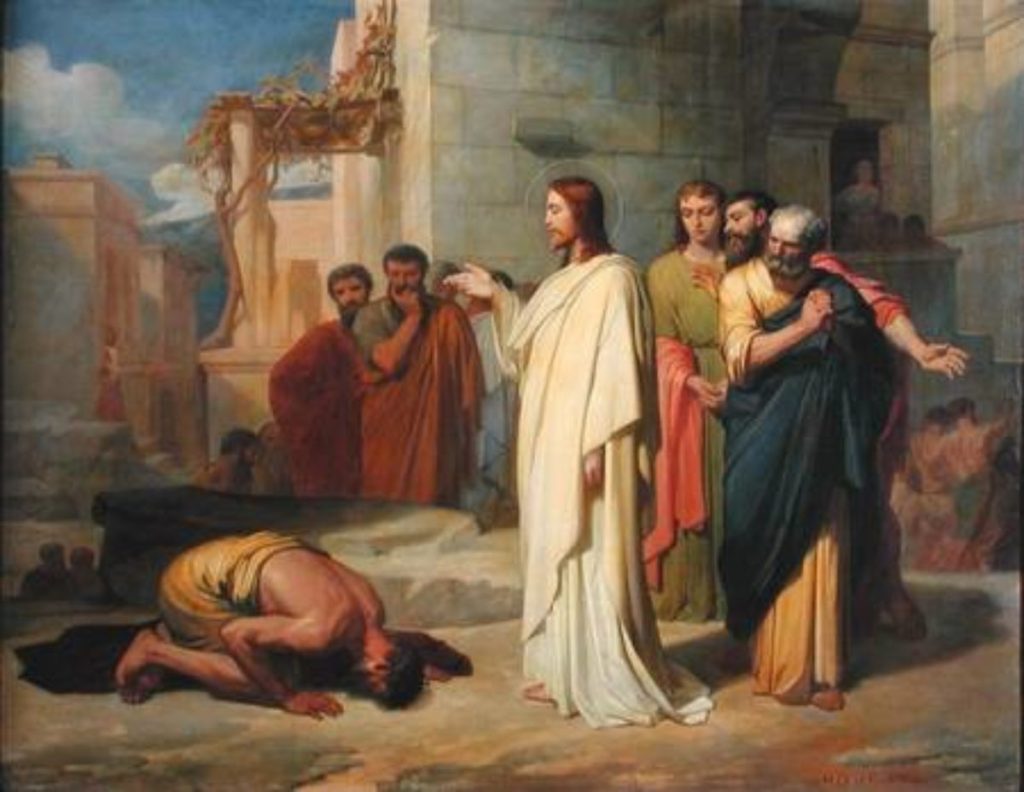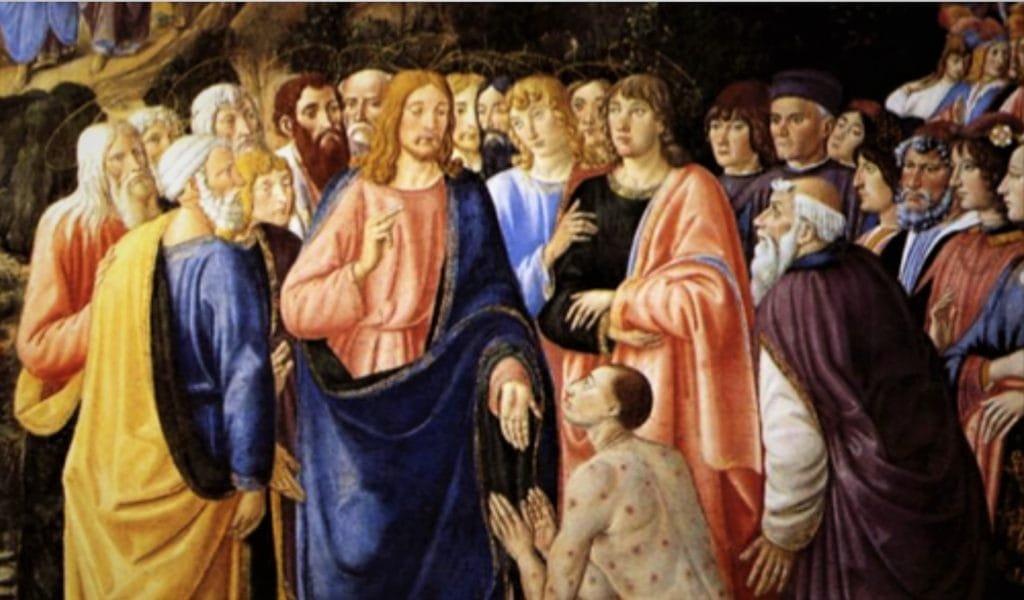HOMILY 6TH SUNDAY IN ORDINARY TIME YEAR B.
JESUS CURES THE LEPER
Outline and links

1. Leprosy, a religious and civil condemnation in the Old Testament
In the ancient times, lepers were marginalized from the society for leprosy was considered not only contagious and incurable but also makes man impure before God according to the Old Law, and must be isolated from the rest of the community.
- This is the reason why in the first reading of this Sunday’s Mass, lepers were obliged to make known their presence and proximity to others. A leper must keep “his garments rent and his head bare, and shall muffle his beard; he shall cry out, ‘Unclean, unclean!’” so that people could avoid them. Moreover, lepers were obliged to live apart from the rest of the population (Lev 13: 44-46).
Leprosy was then considered not only as a grave illness, but also represents a religious and civil condemnation, if not death of the leper.
2. Jesus, the face of God’s mercy, stretches out his hand and touches the leper to cure him.
Considering what was said above, it amazes us how in today’s Gospel, Jesus treated with compassion the sick and the outcast, represented by the humble leper.
“A leper came to Jesus and KNEELING DOWN BEGGED HIM and said, ‘IF YOU WISH, you can make me clean.’ Moved with PITY, he stretched out his hand, TOUCHED HIM, and said to him, ‘I do will it. Be made clean’ .”
Mk 1: 40-41
This brief Gospel passage teaches us the following profound ideas:
- When we ask Our Lord for something, we must ask it with HUMILITY —the leper KNELT down and BEGGED Our Lord—a very striking image which manifests the leper’s indigent condition, humbly asking for God’s mercy.
- In our petitions, we should give PRIMACY TO WHAT GOD WANTS and not to what we want. “If you WISH”, the leper told Our Lord, indicating his RESPECT FOR GOD’S WILL for He knows better than us.
- Utterly different from the usual reaction of the Jews of his time who had neither qualms nor scruples in eluding the leper, Jesus, indifferent to what others would say, and of the rules of his time, was “moved with PITY,…stretched out his hand, TOUCHED HIM” clearly showing us an example of COMPASSION TOWARDS THE SICK, THE OUTCAST, THE MARGINALIZED: TOUCHING THE UNTOUCHABLE.
Touching a leper meant being infected even inside, in the spirit, that is, becoming unclean. But in this case the influence flows not from the leper to Jesus so as to transfer the contagion, but actually from Jesus to the leper so as to grant him purification.
Pope Francis, Angelus, 11 February 2018.
That gesture and those words of Christ contain the whole history of salvation, they embody God’s will to heal us, to purify us from the illness that disfigures us and ruins our relationships. In that contact between Jesus’ hand and the leper, every barrier between God and human impurity, between the Sacred and its opposite, was pulled down.
Pope Benedict XVI, Angelus, 12 February 2012
This gesture of tenderness and compassion teaches us how we should treat others, especially those who are sick and marginalized. Jesus didn’t come to condemn the leper, nor to reject Him. Rather, he showed him the tender compassion all of us need, for we too have our own infirmities which need to be healed by God.
We should thank God for his mercy and compassion. He is willing to heal us of our infirmities as long as we humbly approach him and ask for his help. At present, there are a multitude of sick people suffering: let us ask Our Lord to help and console them, and also contribute something on our part to relieve their sufferings, for when we do so, we are becoming imitators of Christ, as St. Paul reminds us in the 2nd reading.
In his message for Lent 2015, Pope Francis invites us to “ask the Lord:
‘Fac cor nostrum secundum cor tuum’: Make our hearts like yours (Litany of the Sacred Heart of Jesus). In this way we will receive a heart which is firm and merciful, attentive and generous, a heart which is not closed, indifferent or prey to the globalization of indifference.”
Pope Francis, Message for Lent 2015
3. Leprosy, a symbol of sin
Nevertheless, we must be reminded that it is not leprosy or whatever physical illness which makes us unclean but rather our sins. Leprosy is actually a symbol of sin and of its consequences. Through mortal sin, man is lost and disoriented. His life loses its meaning and direction. He ruins himself, the people around him, and his friendship with God. That is why if one were to name the greate tragedy which could happen to a Christian, that would to commit a mortal sin.
Sin “is the true impurity of heart that can distance us from God. It is not in fact the physical disease of leprosy that separates us from God as the ancient norms supposed but sin, spiritual and moral evil.“
Pope Benedict XVI, Angelus, 12 February 2012
Full of faith, we must go to Jesus so that He may clean and purify us, specially in the Sacrament of Confession, for this is where Jesus tells us: “I will: be made clean.”
Jesus, takes from us our diseased humanity and we take from Him his sound and healing humanity. This happens each time we receive a Sacrament with faith: the Lord Jesus “touches” us and grants us his grace. In this case we think especially of the Sacrament of Reconciliation, which heals us from the leprosy of sin.
Pope Francis, Angelus, 11 February 2018.
On the other hand, our Eucharistic offering also purifies and renews us for it the the source of all grace and true life.
As we celebrate as well the Feast of Our Lady of Lourdes who gave St Bernadette an ever timely message: the invitation to prayer and penance, let us allow ourselves to be touched and cleansed by Jesus and to treat our brethren with compassion, who comes to meet us to set us free from every sickness of body and of soul through the intercession of Mother Mary his Mother.
“May this oblation, O Lord, we pray, cleanse and renew us and may it become for those who do your will the source of eternal reward. (Prayer over the offerings, 6th Sunday in Ordinary Time.)”
SEE AS WELL: 6TH SUNDAY IN ORDINARY TIME YEAR B 2024 MASS PRAYERS AND READINGS HERE.
FOR THE REFLECTION HOMILY ON THE 6TH SUNDAY IN ORDINARY TIME YEAR B, CLICK HERE, AND HERE.
Stay updated: subscribe by email for free TO OUR NEW WEBSITE www.catholicsstrivingforholiness.org (PUT YOUR EMAIL IN THE SUBSCRIBE WIDGET).
We are also in www.fb.com/Catholicsstrivingforholiness. Kindly help more people in their Christian life by liking our page and inviting your family, friends and relatives to do so as well. Thanks in advance and God bless you and your loved ones! Fr. Rolly Arjonillo

